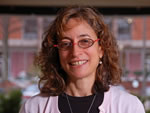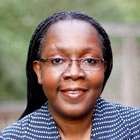 For someone encountering the term “Practice Change Fellow” for the first time, there might be a moment’s pause to figure out how these terms might interrelate. Of course, regular readers will know that such a Fellow is in fact a very important agent of change at the front line of improving health care delivery to older adults. They’re just the kind of people we aim to support. Funded in partnership with the Atlantic Philanthropies, the Practice Change Fellows program offers physicians, nurses, and social workers a unique opportunity to develop and exercise leadership skills over the course of implementing a new geriatric program or service line within their organization. Along with the Foundation’s other grantees who are working to transform organizations and institutions to improve the health of older adults, these Fellows are contributing to the design and implementation of care delivery, the improvement of care coordination and continuity, and the integration of health care services.
For someone encountering the term “Practice Change Fellow” for the first time, there might be a moment’s pause to figure out how these terms might interrelate. Of course, regular readers will know that such a Fellow is in fact a very important agent of change at the front line of improving health care delivery to older adults. They’re just the kind of people we aim to support. Funded in partnership with the Atlantic Philanthropies, the Practice Change Fellows program offers physicians, nurses, and social workers a unique opportunity to develop and exercise leadership skills over the course of implementing a new geriatric program or service line within their organization. Along with the Foundation’s other grantees who are working to transform organizations and institutions to improve the health of older adults, these Fellows are contributing to the design and implementation of care delivery, the improvement of care coordination and continuity, and the integration of health care services.
Last week, I had the privilege of learning firsthand about the work of two Practice Change Fellows who are integrating services for older adults at Federally Qualified Health Centers (FQHCs) and transforming how outpatient primary care is delivered at these community-centered nonprofit organizations. But let me start with a few words about FQHCs. Right now, there are around 1,200 centers delivering care across 7,800 sites. They are organized around a team-based structure, employing 43,000 medical professionals. Of these, more than 9,100 are physicians; 5,800 are nurse practitioners, physician assistants, or clinical nurse midwives; and the balance are nurses and other medical personnel. They operate with an emphasis on coordination and prevention. FQHCs are required to have off-hours coverage and admitting privileges with facility-based providers, and locate their sites to facilitate access to care.
Despite the fact that FQHCs display the team-based characteristics that we believe are so beneficial for geriatric health care, very few FQHCs have targeted their services at older adults. Of the $6.8 billion in total patient-related revenue reported by FQHCs across the country, only 10 percent comes from Medicare, as opposed to 63 percent from Medicaid. The reasons are historical; FQHCs grew out of the movement to provide care to the non-elderly indigent and underserved. Approximately 80 percent receive federal grant funds to cover a share of the cost of providing care to the poor. (The rest satisfy the program requirements but receive no grant funds, or are outpatient clinics operated by the Indian Health Service.) By contrast, geriatric centers were created on a separate track, typically in academic settings that do not include access to the constellation of services at FQHCs.
The existing shortage of geriatric capacity underscores the importance of the efforts being undertaken at FQHCs by our Practice Change Fellows, Drs. Andrea Fox and Ursula McClymont. Both are fellowship-trained geriatricians that have spent their careers developing programs for frail older adults, and both see themselves as part of the  movement to prepare for the demographic wave of older adults.
movement to prepare for the demographic wave of older adults.
Dr. Fox, medical director of the Squirrel Hill Health Center (SHHC) in Pittsburgh, is integrating a mobile medical unit and a dental practice into the center’s multiple complementary services for older patients. SHHC was founded in 2006 to care for older adults as well as religious and ethnic minorities including many new immigrants to Pittsburgh. Over 18 percent of SHHC patients are over age 65, and 8 percent are over age 85.
 Dr. McClymont, medical director for one of six centers in the Baltimore Medical System (BMS), the largest FQHC in Maryland, is designing a program to train and support multidisciplinary teams of physicians, nurse practitioners, nurses, medical assistants, and community health workers to incorporate mental health assessment, diagnosis, and treatment into the primary care visit. The program aims to ensure that more elderly patients with mental health needs receive early attention and treatment. To date the intervention has improved the function of a significant portion of patients.
Dr. McClymont, medical director for one of six centers in the Baltimore Medical System (BMS), the largest FQHC in Maryland, is designing a program to train and support multidisciplinary teams of physicians, nurse practitioners, nurses, medical assistants, and community health workers to incorporate mental health assessment, diagnosis, and treatment into the primary care visit. The program aims to ensure that more elderly patients with mental health needs receive early attention and treatment. To date the intervention has improved the function of a significant portion of patients.
The work of Drs. Fox and McClymont will enable other FQHCs and community health centers to serve a growing number of our nation’s elders. It is likely that, as health care reform initiatives begin to take effect, FQHCs will serve an increasing percentage of the elderly population. In 2010, the Affordable Care Act provided $11 billion to the Bureau of Primary Care to increase the number and capacity of FQHCs. Among policy makers, FQHCs are now viewed as an enormous platform to shape health care quality, implement health information technology, and drive population-based and team-based care. The upcoming conversion in 2014 to a new Medicare prospective payment system for FQHCs will provided an incentive to serve more Medicare beneficiaries, as payments will likely increase under the new system, according to a report by Medpac.
As our country increases its reliance on FQHCs to provide care to elders, the vital work of Drs. Fox and McClymont in adapting their practices to serve older adults will provide a valuable road map for other organizations to follow.
